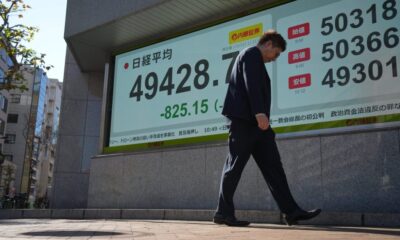Business
Price Wars Intensify as Chinese Car Sales Slow in July

The growth of new energy vehicles (NEVs) in China has significantly slowed, with a mere 12% increase in July compared to nearly 20% in June. This decline, reported by the China Passenger Car Association, is attributed to decreased demand for hybrid vehicles and ongoing challenges within the automotive sector. Overall car sales in China also decelerated, increasing by only 6.9% in July, a stark contrast to the 18.6% rise recorded in June.
The government has been tackling overcapacity issues in the vehicle manufacturing sector, which has sparked price wars and financial losses for numerous automakers. Despite these challenges, sales of battery electric vehicles (BEVs) continue to demonstrate resilience, outpacing conventional gasoline-fueled vehicles for the fifth consecutive month.
Hybrid Sales Decline Amid Strong BEV Performance
Sales of hybrid vehicles, which include plug-in and extended-range models, experienced a 3.6% drop in July compared to the same month last year. This decline comes as advancements in battery technology enhance the performance and appeal of BEVs. Several manufacturers, such as Leapmotor, Xpeng, and Xiaomi, recorded record sales in July largely due to the rising demand for BEVs.
In contrast, BYD, the market leader that relies heavily on hybrid sales, reported its third consecutive month of falling sales in July. BYD’s market share in the NEV segment dwindled to 27.8% from 35.4% in July 2023. This shift highlights the challenges facing traditional hybrid manufacturers amidst a rapidly evolving market landscape.
The overcapacity within the Chinese automotive industry has been a persistent issue, affecting profitability across various clean technology sectors, including solar panel and electric vehicle manufacturers. The government has initiated measures aimed at curtailing excess capacity, but the impact remains to be seen.
Government Measures and Market Competition
The competitive landscape for electric vehicles has intensified, with numerous manufacturers vying for state-based incentives. According to a report from the research firm Rhodium Group, this fierce competition has resulted in a significant decline in EV and battery prices. While this price reduction has facilitated wider adoption of electric vehicles, it has simultaneously contributed to massive overcapacity in battery production.
As the global market for electric vehicles expands, the oversupply may hinder new entrants from gaining a foothold. The ongoing price wars not only affect manufacturers but also influence consumer choices as buyers navigate an increasingly complex market.
In summary, July’s sales figures reflect a challenging environment for Chinese car manufacturers, with slower growth in new energy vehicles and intensified competition leading to price wars. As the industry adapts to shifting consumer preferences and government regulations, the future of the automotive sector in China remains uncertain.
-

 Politics4 weeks ago
Politics4 weeks agoSecwepemc First Nation Seeks Aboriginal Title Over Kamloops Area
-

 World5 months ago
World5 months agoScientists Unearth Ancient Antarctic Ice to Unlock Climate Secrets
-

 Entertainment5 months ago
Entertainment5 months agoTrump and McCormick to Announce $70 Billion Energy Investments
-

 Science5 months ago
Science5 months agoFour Astronauts Return to Earth After International Space Station Mission
-

 Lifestyle5 months ago
Lifestyle5 months agoTransLink Launches Food Truck Program to Boost Revenue in Vancouver
-

 Technology3 months ago
Technology3 months agoApple Notes Enhances Functionality with Markdown Support in macOS 26
-

 Lifestyle3 months ago
Lifestyle3 months agoManitoba’s Burger Champion Shines Again Amid Dining Innovations
-

 Top Stories2 months ago
Top Stories2 months agoUrgent Update: Fatal Crash on Highway 99 Claims Life of Pitt Meadows Man
-

 Politics4 months ago
Politics4 months agoUkrainian Tennis Star Elina Svitolina Faces Death Threats Online
-

 Sports5 months ago
Sports5 months agoSearch Underway for Missing Hunter Amid Hokkaido Bear Emergency
-

 Politics5 months ago
Politics5 months agoCarney Engages First Nations Leaders at Development Law Summit
-

 Technology5 months ago
Technology5 months agoFrosthaven Launches Early Access on July 31, 2025





















